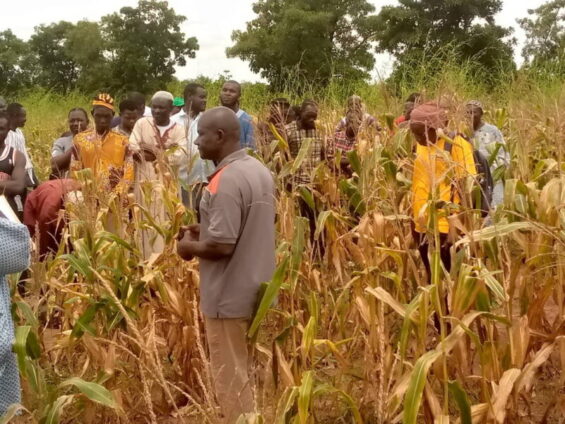The Savanna Agricultural Research Institute of the Council for Scientific and Industrial Research (CSIR-SARI) has introduced farmers in Manwe and Goripie in the Wa East District to stress-tolerant and hybrid maize varieties.
This introduction took place during a farmers' field day organised by CSIR-SARI in Manwe, where the farmers were acquainted with the benefits of these improved maize varieties. The demonstration fields showcased climate-resilient maize hybrids as part of the “Participatory On-Farm Testing of Stress-Tolerant Maize in the Upper West Region of Ghana” project, funded by the International Institute of Tropical Agriculture (IITA).
Addressing the farmers, Dr Mahama G. Yakubu, a Senior Research Scientist at CSIR-SARI, Wa station, noted that these demonstration fields were designed to facilitate the testing, promotion, and eventual adoption of the maize varieties by farmers. He emphasised the importance of adopting climate-smart maize varieties and hybrids to improve economic gains.
“Due to climate change, it is crucial to develop climate-smart hybrids. Climate-smart means the variety matures early, is stress-tolerant, high-yielding, and also meets consumer preferences to enhance livelihoods,” Dr Yakubu explained.
He added that the hybrids possess built-in tolerance mechanisms for water shortage, allowing them to produce more than traditional maize varieties during drought conditions. Additionally, several of these improved varieties have shorter maturity periods, which are better suited to the increasingly erratic rainfall in northern Ghana.
“With a stress-tolerant maize genotype, farmers are more likely to achieve food security, allocate less land to maize, and invest in other crops, promoting a more balanced diet, higher incomes, and improved soil fertility,” he stated.
However, Dr Yakubu, who is also an agronomist, advised that the yield potential of the hybrid maize varieties could only be realised if farmers adhered to good agronomic practices (GAPs), such as proper land preparation and timely weeding. Other essential GAPs he mentioned included the “4Rs” of nutrient stewardship (right source, right rate, right time, and right place), pest control, and timely harvesting.
Some farmers, who spoke to the Ghana News Agency (GNA) during the field visit, expressed optimism that the improved maize varieties would help them address the challenges posed by irregular rainfall patterns.
Latest Stories
-
Ghana-Russia Centre to run Russian language courses in Ghana
3 hours -
The Hidden Costs of Hunger: How food insecurity undermines mental and physical health in the U.S.
4 hours -
18plus4NDC marks 3rd anniversary with victory celebration in Accra
7 hours -
CREMA workshop highlights collaborative efforts to sustain Akata Lagoon
7 hours -
2024/25 Ghana League: Heart of Lions remain top with win over Basake Holy Stars
8 hours -
Black Queens: Nora Hauptle shares cryptic WAFCON preparation message amid future uncertainty
8 hours -
Re-declaration of parliamentary results affront to our democracy – Joyce Bawah
8 hours -
GPL 2024/25: Vision FC score late to deny Young Apostles third home win
9 hours -
Enhancing community initiatives for coastal resilience: Insights from Keta Lagoon Complex Ramsar Site Workshop
9 hours -
Family Health University College earns a Presidential Charter
9 hours -
GPL 2024/25: Bibiani GoldStars beat Nsoatreman to keep title race alive
9 hours -
GPL 2024/25 Bechem United keep title hopes alive with narrow win over FC Samartex
9 hours -
2024/25: Dauda Saaka scores as Asante Kotoko beat Dreams FC
9 hours -
M.anifest reflects on galamsey’s devastation 11 years after ‘No Shortcut to Heaven’
10 hours -
We’ll have the last laugh – Sammy Gyamfi slams EC’s “cantata” re-collation
10 hours

